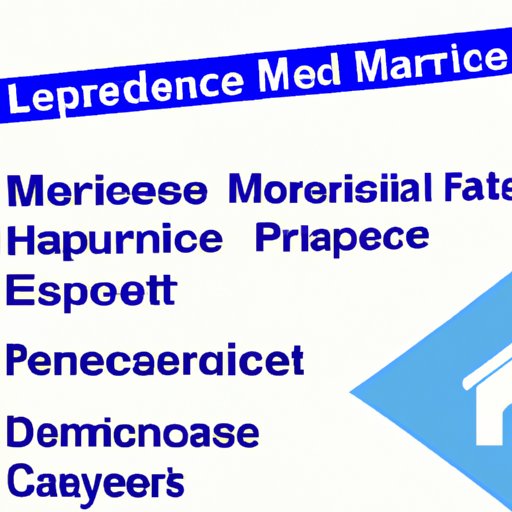Introduction
Hospice care is a type of specialized medical care that focuses on providing comfort, rather than curing an illness or disease. It is provided to people who have been diagnosed with a terminal condition, such as cancer, heart failure or Alzheimer’s disease. The goal of hospice care is to help patients manage pain and other symptoms, while improving their quality of life during their remaining time.
Many people wonder if Medicare covers hospice care. The answer is yes. Medicare provides coverage for hospice care under its Part A (Hospital Insurance) program. In general, Medicare will cover most of the costs associated with hospice care, including inpatient and outpatient care, home health services and respite care.

Eligibility Requirements for Medicare Coverage of Hospice Care
In order to be eligible for Medicare coverage of hospice care, you must meet certain criteria. First, you must be enrolled in Medicare Part A and be eligible for benefits. Second, you must have a terminal illness, which is defined as an illness with a prognosis of six months or less if the illness runs its normal course. Third, you must have elected to receive hospice care instead of curative treatment.
Once you have met the eligibility criteria, your doctor must certify that you are terminally ill and require hospice care. You must also select a Medicare-approved hospice provider and sign a statement of understanding regarding the services they will provide.
Types of Services Covered Under Medicare for Hospice Care
Medicare covers a range of services related to hospice care, including inpatient care, outpatient care, home health services and respite care. Inpatient care is typically provided in a hospital or hospice facility and may include medical, nursing and other related services. Outpatient care is provided in the patient’s home or other non-hospital setting and may include doctor visits, medications and other treatments. Home health services include skilled nursing care, physical therapy and other services that can be provided in the patient’s home.
Respite care is also covered under Medicare. This type of care provides temporary relief for the family or primary caregivers of the patient. It can be provided in the patient’s home, a hospital or a hospice facility.

Cost of Hospice Care and How Medicare Helps Pay for It
The cost of hospice care can vary depending on the type of services provided. Generally speaking, hospice care is much less expensive than traditional medical care for a terminal illness. According to a study published in American Family Physician, “Hospice care is one of the most cost-effective forms of health care available.”
Medicare helps pay for hospice care through its Part A program. Medicare will cover most of the costs associated with hospice care, including inpatient and outpatient care, home health services and respite care. However, there may be some out-of-pocket expenses, such as copayments and coinsurance, that the patient is responsible for.
Benefits of Medicare-Covered Hospice Care
There are many benefits to receiving Medicare-covered hospice care. On the physical level, hospice care can help manage pain and other symptoms, allowing patients to remain comfortable during their final days. On the emotional and mental level, hospice care can provide support for both the patient and their family, helping them cope with the difficult process of end-of-life care.
On the financial side, Medicare-covered hospice care can help relieve the burden of paying for expensive medical treatments. As noted above, hospice care is one of the most cost-effective forms of health care available.

Tips on Choosing a Hospice Provider Who Accepts Medicare
When choosing a hospice provider, it is important to do your research. Make sure you understand the services they offer and their payment options. Ask questions about the types of care they provide and whether they accept Medicare. Also consider factors such as location, convenience and reputation.
Conclusion
In conclusion, Medicare covers hospice care under its Part A program. To be eligible for coverage, patients must meet certain criteria, including having a terminal illness and electing to receive hospice care instead of curative treatment. Medicare covers a range of services related to hospice care, including inpatient and outpatient care, home health services and respite care. The costs associated with hospice care are generally much lower than traditional medical care, and Medicare helps pay for these costs. Finally, there are many benefits to receiving Medicare-covered hospice care, both physically, emotionally and financially. When choosing a hospice provider, it is important to do your research and make sure they accept Medicare.
(Note: Is this article not meeting your expectations? Do you have knowledge or insights to share? Unlock new opportunities and expand your reach by joining our authors team. Click Registration to join us and share your expertise with our readers.)
